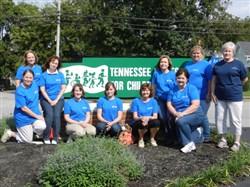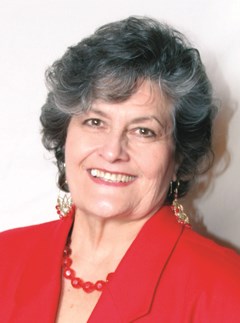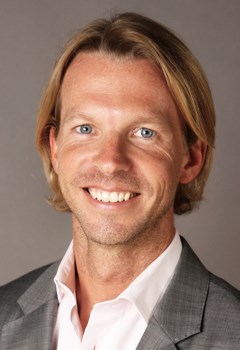VOL. 37 | NO. 11 | Friday, March 15, 2013
Innovation, thrift drives nonprofit success
By Linda Bryant

Volunteers from HCA who helped out at the Tennessee Voices for Children.
-- SubmittedTo survive the Great Recession and its aftermath, many nonprofit organizations in Middle Tennessee tightened their belts and searched for ways to meet increasing demands for services despite diminishing resources.
Some are beginning to thrive again.
“Our nonprofits have stabilized, but at a somewhat lower level than where they were at before the recession,” says Lewis Lavine, executive director of the Center for Nonprofit Management, a Nashville-based agency that works to improve the skills of nonprofit executives.
“Most lost 18-20 percent (of contributions and financial assets) and were forced to reduce staff and/or programs,” he adds. “They returned to their missions and eliminated things that weren’t quite as essential as they thought. Very few went out of business, but they still faced huge challenges.”
The strongest local survivors are agencies that are using newfound entrepreneurial skills, collaborating and sharing resources with other nonprofits and carefully tracking the outcomes of their services, local nonprofit experts say.
Among the more innovative and trend-setting local projects:
- Oasis Center’s neurofeedback side business, Neuroclarity
- Dismas House’s Triple Thread Apparel T-shirt business
- Teach Twice, a cultural storytelling exchange between the U.S. and developing nations
- Collaboration College, an initiative to develop models to share resources and expenses for nonprofits
- A soon-to-be-released documentary to support Tennessee children with mental illness
Beyond a ‘warm and fuzzy story’
“The recession affected everyone, and there are some byproducts,” says Mark Dunkerly, vice president of development for Oasis Center, a longstanding Nashville-based nonprofit that serves at-risk youth.
“As a result we take a closer look at just about every aspect of the agency and we are more focused on outcomes.
“We have to do more than tell a warm and fuzzy story,” he adds. “We are sure to track data. You can’t just say you are uniting families, we have to quantify how many families are reunited and track them and find out if they are still together.”

Charlotte Bryson
Oasis Center launched Neuroclarity, a side business designed to bring in additional revenue. The business provides neurofeedback, a type of noninvasive EEG technology that has proven effective in helping to treat depression, anxiety and sleep disorders. The agency offers the service free to youth clients and to the general public for a fee.
The business brought in an additional $25,000 in revenue to Oasis in its first year and won the Frist Foundation Award for Achievement for revenue development in 2012, which landed the agency another $25,000.
James Vaillancourt, an associate professor in Lipscomb University’s MBA program and a senior consultant at the Center for Nonprofit Management, says nonprofits will continue to develop entrepreneurial skills in order to raise critical funds and stay relevant.
“I think you’ll see a greater concentration of effort on businesses and social enterprises,” Vaillancourt says. “Business ventures that are in line with an agency’s mission will tend to be the most successful.”
Lipscomb is the only school in the area that offers an MBA with a concentration in nonprofit studies. Vaillancourt says the program has gained popularity in the past three years.
“It’s definitely a growing program,” he says. “It’s wonderful that so many young business majors are very interested in nonprofits.
The Millennial generation
Nonprofits are benefitting from a groundswell of innovation and involvement from the Millennials, the generation born in the 1980s and 1990s.
In 2011, a group of Vanderbilt University student volunteers at Dismas House of Nashville came up with the idea for T-shirt screening company that would generate revenue for the independent living facility for ex-offenders and supply its residents with jobs.
The result was Triple Thread Apparel, which sells T-shirts to the college, university and nonprofit markets.
In less than three years, Triple Thread has won awards and grants, including a Clinton Global Initiative University Outstanding Commitment Award, a $15,000 grant from the Corrections Corp. of America and a $30,000 grant from the Frist Foundation.
Former President Clinton provided additional exposure when he mentioned Dismas House and Triple Thread on “Good Morning America.”
“I think you’ll see more and more examples of young people coming forward to help nonprofits, even at the high school level,” says Dan Surface, CEO of Dismas House and Triple Thread.
“This is generation that lives and breathes technology; they can bring a lot to the table. Plus, many of them are going to schools that emphasize service learning. They are being challenged to create innovative solutions to community problems and following through.”
The ‘Teach Twice’ model
Trevor Burbank, a 2012 Vanderbilt graduate, launched Teach Twice, a nonprofit social venture that educates children and communities through storytelling and cultural exchange.

Brian Williams
In the Teach Twice model, a single book written by authors from a developing country provides parents and schools multicultural stories to read to their children. Schools and students in the developing nation then receive financial support.
Burbank and his team work from a small office in Edgehill Village and are trying to get Teach Twice books into public and private schools and libraries, including those located in Middle Tennessee, and designing a program that will dispatch Teach Twice volunteers locally.
Burbank was recently chosen as one of five “Impact Fellows” by Kairos Society, a national nonprofit that supports entrepreneurial-minded nonprofits.
Collaboration, shared resources
As a result of the recession’s impact on nonprofits, the Nashville-based HCA Foundation decided to help local nonprofits navigate the troubled economic times by providing training, education and support.
The foundation helped agencies develop new skill sets, which included strengthening governing boards, tapping the talents of skilled volunteers and partnering and collaborating with other agencies and businesses.
Joanne Pulles, president of the HCA Foundation, gives local nonprofits high praise for adapting to the “new normal” of nonprofit management, which she says includes tighter financial constraints, increased demands from clients and the critical need for innovation and creativity.
“One of the strongest trends we’re seeing is an increased ability to look beyond your own walls for strategic partnerships and collaboration,” Pulles says. “You are only going to see it increase.”
In 2011, the HCA Foundation joined with Lipscomb University and the Center for Nonprofit Management to launch Collaboration College, an initiative to develop models of collaboration which can be replicated around the country.
Six teams, composed of 18 local nonprofit organizations, worked for a year to come up with innovative models for shared expenses or the delivery of services.
At the end of the inaugural year, the foundation awarded a $25,000 grant to the Collaboration for Family Support, a joint project of immigrant families coordinated by four local agencies—Nurses for Newborns, Family & Children’s Service, Martha O’Bryan Center and Conexion Americas.
The HCA Foundation, which is philanthropic arm of the HCA hospital chain, was not immune from the impact of the recession.
Pulles says the foundation has learned to rely more on its own strategic partnerships. For example, Collaboration College received skilled volunteer help, including more than $80,000 in consulting donated by North Highland, C3 Consulting and HCA and $30,000 in consulting from the Center for Nonprofit Management.
Lipscomb University contributed its executive leadership, classrooms and other academic resources to help facilitate these collaborations.
Documentary for Tenn. Voices
“The recession was a very difficult time for us, but we also learned lessons from it,” says Charlotte Bryson, executive director of Tennessee Voices for Children, a nonprofit group founded in 1990 by Tipper Gore as an advocacy and support network for children with mental illness.
“We had to figure out how to serve more people with the same amount of staff,’’ she says. “It meant that the staff increased the diversity of what they do with clients. We had to work twice as hard to maintain funding, but we were able to maintain. We are a more efficient organization today because of it.”
The agency is heavily involved with collaborative partnerships with mental health centers across the state.
Bryson says the agency was also forced to think creatively about marketing and fundraising, which resulted in the idea for an in-depth 90-minute documentary by local filmmaker David Earnhardt about the state of the children’s mental health system. The film, which is in the post-production phase, is slated to premiere at the Belcourt Theatre in July.
“We believe it will raise awareness about Tennessee Voices for Children and help raise funds,” Bryson says. “We have a chance to impact a lot of people with this film.”
Nonprofit jobs returning
Before the recession hit in 2007 the Center for Nonprofit Management posted an average of 130 nonprofit jobs a month on their online job board. By the summer of 2008, that number had dwindled to 30.
“Those job board numbers are a good illustration of what we went through,” Lavine says. “Now we are up to 70-80 postings a month.”
Rebecca Finley, communications director at the Community Foundation of Middle Tennessee, also is seeing positive signs.
Finley says there was an increased number of established funds from 2011 to 2012 and that 2013 is beginning at a faster pace than 2012.
Under one roof
Another growing trend is for nonprofits to cluster under the same roof or in the same general area. Hands On Nashville, a volunteer resource center, and the Center for Nonprofit Management moved in together at the Trolley Barns at Rolling Mill Hill in 2012.
The agencies decided to share two employees and consolidated back-office functions such as billing and payroll, moves that saved additional money.
Oasis Center is housed at the Youth Opportunity Center at 1704 Charlotte Pike, a 39,000-square-foot facility with several other youth agencies, including Big Brothers Big Sisters of Middle Tennessee, STARS, Meharry Youth Wellness Center, Nashville Career Advancement Center, Youth CAN, Tennessee College Access, and others.
STARS, an in-school-based intervention and prevention program for youth with substance abuse problems or who are having issues with bullying or other barriers to school success, co-developed the Youth Opportunity Center with Oasis Center.
Roger Dinwiddle, chief executive officer of STARS, says the agency has been able to save about $300,000 annually because of shared agreements with fellow nonprofits that include joint purchasing and maintenance contracts and shared administrative and HR services.
“It is much easier to collaborate if you are in the same space,” says Brian Williams, executive director of Hands On Nashville.
Williams thinks the for-profit sector could learn some cost-cutting secrets from nonprofits.
“Nonprofits have a long history of making the most out of what they are provided,” Williams says. “We have to have a balanced budget or we’ll have to shut down services. We were stretching dollars before the recession, and we’re stretching them now. The recession gave us a chance to get a lot more creative about how to make every dollar count.”